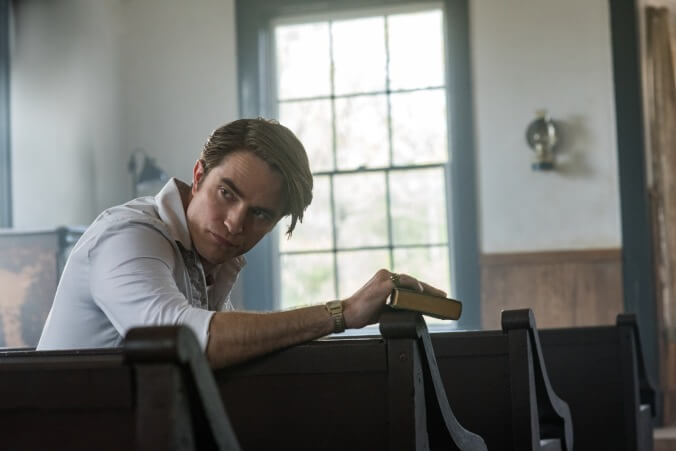Everyone’s a sinner in Antonio Campos’ moody coal country crime drama The Devil All The Time

Note: The writer of this review watched The Devil All The Time from home on a digital screener. Before making the decision to see it—or any other film—in a movie theater, please consider the health risks involved. Here’s an interview on the matter with scientific experts.
Two crucifixions loom over director Antonio Campos’ The Devil All The Time. The first is the one that killed Jesus Christ. The other is the one that World War II veteran Willard Russell (Bill Skarsgård) witnesses on the Solomon Islands, when he finds a fellow soldier who’s been flayed and strung up while still alive. When he returns from the war to his home in southeastern Ohio, Willard isn’t particularly religious. But the more he roots himself in his community, and the more he thinks about the terrible things he’s seen, the more fervently Christian he becomes. Like a lot of the characters in this story, when Willard needs something beyond his capacity to deliver, he prays hard. Sometimes he even makes blood sacrifices, just as the Holy Bible demands.
Still, God does nothing. It seems only human beings—vile, needy, greedy human beings—can change what happens to each other.
Campos and his brother Paulo wrote the screenplay for The Devil All The Time, based on a 2011 Donald Ray Pollock novel. The Campos brothers compress some elements of Pollock’s book, to make it less episodic and more like one continuous story. But they retain the overall meaning and tone, making something that feels equally inspired by seamy Jim Thompson novels and florid Southern gothic literature. The film is mostly set in the 1950s and ’60s, in an unincorporated area of coal country near the borders of Ohio, West Virginia, and Kentucky known as Knockemstiff. The underpaid, hard-working folks who live in the tiny, interconnected hillside communities in The Devil All The Time are almost in an entirely different America, with their own sets of laws and beliefs.
The story’s main focus is on Willard’s teenage son Arvin (Tom Holland), who endures a series of family tragedies that leave him as hardened as his dad. With no real long-term goals, Arvin mostly spends his days looking out for his own people—and especially his orphaned friend Lenora (Eliza Scanlen), who gets mercilessly bullied by the older boys at their school. Lenora is the daughter of the fiery preacher Roy Laferty (Harry Melling), who died under mysterious circumstances; she’s secretly being seduced by the new minister, Reverend Preston Teagardin (Robert Pattinson), who uses scripture to belittle and manipulate his congregation. Meanwhile, the whole area is being very loosely policed by the corrupt Sheriff Lee Bodecker (Sebastian Stan), whose own sister Sandy (Riley Keough) is one half of a couple who get their kicks by seducing lonely travelers and then murdering them. (Jason Clarke plays the other half.)
In short: The Devil All The Time is a portrait of a place populated by creeps and abusers, where the police and the church offer little refuge. Campos and his ace cast tell this bleak tale in a series of dramatic set pieces, meant to plunge viewers deep into a region dominated by darkness and fear. The movie runs a little over two hours, and roughly every 10 minutes there’s another riveting, unnerving scene: like when Roy proves his faith in church by pouring a box of live spiders over his head, or when Preston delivers an insulting sermon around Willard’s grandmother’s potluck plate of fried chicken livers. Campos—best-known for the jittery character dramas Afterschool and Christine, and for helping establish the moody atmosphere of the thoughtful TV crime series The Sinner—has a knack for creating moments on screen that are both uncomfortable to watch and difficult to turn away from.
His approach mostly works here, with a few exceptions. The pace slackens too much in the film’s final third, as the plot stops racing ahead through the characters’ lives and instead carefully positions them for a series of final confrontations. And while the performances are all strong, some of the attempts at Southern accents—Pattinson’s in particular—come across as exaggerated to the point of becoming cartoonish. There’s also a fogginess sometimes about Campos’ intentions. This is a grim picture about unhappy people; and it’s reasonable to wonder what the ultimate purpose is.
An answer of sorts comes late in the movie, when Arvin encounters a hippie on his way to Cincinnati. So much of this story takes place in what feels like an enclave inside Ohio, frozen in time and trapped in cycles of violence that the residents have just sort of… normalized, like a mass delusion. But what’s haunting about The Devil All The Time—and, ultimately even a little hopeful—is this idea that there’s a world beyond this world, where perhaps not everyone is so cruel or intense. It may not be the biblical Heaven; but that’s okay. Sometimes Cincinnati will suffice.